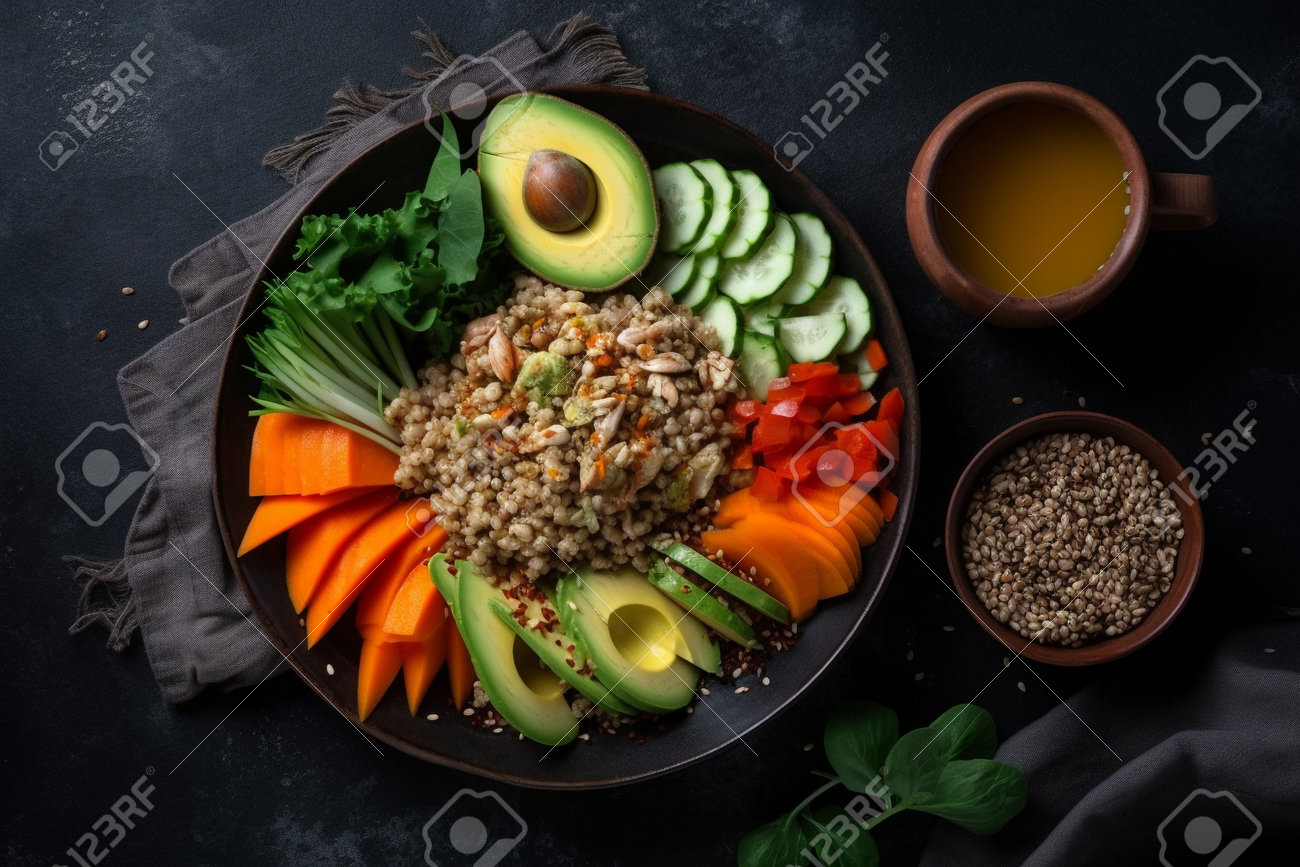Are you considering making the switch to a vegetarian diet? There are many reasons why vegetarian foods are becoming increasingly popular. From their health benefits and environmental impact to their range of flavors and textures, there are countless reasons to choose vegetarian foods. In this article, we’ll explore 10 of the top reasons to choose vegetarian foods. From increased energy levels to better digestion, you’ll discover why vegetarian foods are a great option for anyone looking to improve their overall health and well-being.
A. Definition of Vegetarian Foods
Vegetarian foods are foods that do not contain any meat or animal products. This includes any food that is directly derived from animals, such as eggs, milk, and honey. Vegetarian foods are typically plant-based and can be eaten as part of a healthy, balanced diet. Examples of vegetarian foods include fruits, vegetables, grains, legumes, nuts, and seeds. Many people choose to follow a vegetarian diet for ethical, environmental, or health reasons. Eating a variety of vegetarian foods can help to ensure that you get the essential vitamins and minerals needed for good health.
B. Benefits of Eating Vegetarian Foods
Eating vegetarian foods has a lot of health benefits. Plant-based diets are low in saturated fats, free of cholesterol, and high in fiber, vitamins, and minerals. Studies show that those who follow a vegetarian diet have a lower risk of developing high blood pressure, heart disease, diabetes and some types of cancer. Additionally, vegetarian diets are associated with lower levels of obesity.
Vegetarian foods are also generally high in important nutrients like potassium, magnesium, folate, and vitamins A, C, and E. Furthermore, they are a great source of antioxidants, which help reduce inflammation and protect the body from disease. Many vegetarian-friendly foods, such as legumes, nuts, and seeds, are packed with essential fatty acids and provide the body with essential nutrients.
In addition to the health benefits, vegetarian diets are also better for the environment. Plant-based diets require less water and land to produce, and they produce fewer greenhouse gas emissions than diets that include meat. Eating vegetarian foods can also help reduce animal suffering, as animals are not raised for food production.
Choosing vegetarian foods can be a rewarding and tasty experience. There are a wide variety of vegetarian-friendly foods available, from fruits and vegetables to grains, legumes, nuts, and seeds. There are also many delicious vegetarian recipes available online. So, if you’re looking to improve your health and help the environment, consider adding more plant-based foods into your diet.
II. 10 Reasons to Choose Vegetarian Foods
Vegetarian foods are becoming increasingly popular as more and more people are turning towards healthier eating habits. Not only do they provide essential nutrients and vitamins, but they also offer a wide variety of flavours and textures. Here are 10 reasons why you should choose vegetarian foods:
1. Improved Health: Vegetarian foods are typically low in fat, cholesterol and sodium. They are also high in fiber, vitamins and minerals. Eating a vegetarian diet can help reduce your risk of chronic diseases such as heart disease, diabetes and some cancers.
2. Environmentally Friendly: Plant-based foods require less water, land and energy to produce than animal-based products. Eating more vegetarian foods can help reduce your carbon footprint and minimize your environmental impact.
3. Ethical Considerations: Eating a vegetarian diet can help reduce animal cruelty and the suffering of animals used for food production.
4. Cost Effective: Vegetarian foods are generally cheaper than animal-based products. You can save even more money by buying in bulk or growing your own produce.
5. Variety: There is a wide variety of vegetarian foods available, from healthy grains to delicious fruits and vegetables. You can also find vegan versions of your favorite dishes.
6. Increased Energy: Eating a healthy vegetarian diet can help you feel more energized throughout the day.
7. Improved Digestion: A plant-based diet can help your body process food more efficiently. Eating vegetarian foods can also help reduce gas, bloating and constipation.
8. Weight Loss: Eating a vegetarian diet can help you lose weight more easily and keep it off.
9. Nutrient Dense: Vegetarian foods are packed with essential nutrients and vitamins that your body needs.
10. Delicious Taste: Vegetarian foods can be just as delicious as animal-based products. You can find a variety of recipes online that are both healthy and tasty.
Making the switch to a vegetarian diet can be a great way to improve your health, reduce your environmental impact, and save money. Try incorporating more vegetarian foods into your diet and reap the many benefits they have to offer.
A. Environmental Impact
As the world population continues to grow, so does the impact of our daily lifestyle choices on the environment. One of the most effective ways to reduce our environmental impact is to switch to a vegetarian diet. Not only is a vegetarian diet healthier and kinder to animals, it also has a much lower environmental impact than a meat-based diet.
Vegetarian foods require significantly fewer resources to produce than their meat-based counterparts. Livestock production is extremely resource-intensive, requiring large amounts of land, water, and energy. Growing vegetarian foods such as fruits, vegetables, grains, and legumes requires much less land, water, and energy, meaning that there is less of an environmental impact.
In addition to using fewer resources, vegetarian foods also produce less greenhouse gas emissions. Livestock production is one of the largest sources of greenhouse gas emissions, contributing significantly to global warming. Eating vegetarian foods reduces these emissions, helping to slow the effects of climate change.
Eating a vegetarian diet is one of the most effective ways to reduce your environmental impact. Not only is it healthier and kinder to animals, it also helps to preserve our planet’s resources and reduce greenhouse gas emissions. By making the switch to vegetarian foods, you can make a real difference to the environment.
B. Health Benefits
Eating a vegetarian diet can be beneficial for your health in many ways. Vegetarian foods are naturally low in fat and cholesterol, and are also rich in fiber, vitamins, and minerals. Eating a vegetarian diet can help to reduce your risk of heart disease, diabetes, and even some types of cancer. Additionally, vegetarian foods are often more affordable than other types of food, making them a great option for those on a budget.
Vegetarian diets also have plenty of environmental benefits. By cutting out animal products, you are helping to reduce your carbon footprint and reduce the amount of water and energy used in the production of food.
Though there are many health benefits to eating a vegetarian diet, it is important to remember that this type of diet is not for everyone. If you are considering a vegetarian diet, make sure to consult with your doctor first to make sure it is right for you.
C. Cost Savings
With the rising cost of food, it is becoming increasingly important to find ways to save money. One of the most effective ways to do this is to switch to a vegetarian diet. Not only does a vegetarian diet reduce your overall food costs, but it also has numerous health benefits.
Eating a vegetarian diet can be much more cost effective than a traditional meat-based diet. Vegetarian foods, such as beans, legumes, and grains, are usually cheaper than meats, and they can be used to create delicious and nutritious meals. Additionally, when you buy in bulk, you can save even more money.
A vegetarian diet also has numerous health benefits. Studies have shown that vegetarians tend to have lower cholesterol and blood pressure levels, as well as a lower risk of heart disease, stroke, and some types of cancer. Additionally, vegetarian diets may help with weight-loss, as they are often higher in fiber and lower in calories than meat-based diets.
So, if you’re looking to save money and improve your health, consider switching to a vegetarian diet. It may be just the cost-saving and health-boosting solution you’re looking for!
D. Variety of Dishes
Vegetarian dishes are becoming increasingly popular among those looking to reduce their meat intake or who are simply looking for something new and exciting to try. Vegetarian dishes are not only delicious and nutritious, but they also offer a variety of options that can be used to fit any dietary needs or preferences. Whether you are looking for a quick and easy meal or a more complex dish, there is sure to be a vegetarian option that will satisfy your taste buds and provide your body with the nutrition it needs. From hearty soups and stews to creative salads and wraps, there is a vegetarian dish for everyone.
For those who are short on time, there are plenty of vegetarian dishes that can be prepared quickly. This includes simple ingredients such as quinoa, lentils, and beans, which can be added to salads, sandwiches, and wraps. These dishes can be filled with fresh vegetables, nuts, and seeds, and are a great way to get your protein and fiber without having to cook a large meal.
For those looking for a more complex meal, there are also a variety of vegetarian dishes that can be made in the comfort of your own home. This includes dishes such as roasted vegetables, grilled tofu, and stuffed peppers. These dishes can be dressed up or down depending on your preferences and can be enjoyed as a main course or as a side dish.
Vegetarian dishes are a great way to add variety to your diet and can be enjoyed by everyone, regardless of dietary preferences or restrictions. Whether you are looking for a quick and easy meal or something more complex, there is sure to be a vegetarian dish that will satisfy your taste buds and provide your body with the nutrition it needs.
E. Ethical Considerations
Vegetarian diets are becoming increasingly popular for health and ethical reasons. Eating a vegetarian diet means avoiding all animal products, including meat, dairy, and eggs. While there are many benefits to a vegetarian diet, there are also some ethical considerations.
First and foremost, when making the decision to switch to a vegetarian diet, it is important to consider the welfare of animals. Animals raised for meat, dairy, and eggs are often kept in cramped and unhealthy conditions, and they are not given the chance to live natural lives. Avoiding animal products is one way to help reduce the demand for these products and, in turn, reduce the number of animals kept in these conditions.
Secondly, when choosing vegetarian options, it is important to consider the environmental impact of food production. Many vegetarian products, such as soy and processed foods, require a lot of energy and water to produce. Therefore, opting for more sustainable vegetarian options, such as local fruits and vegetables, is a more ethical choice.
Finally, it is important to remember that vegetarian diets are not necessarily healthier than diets that include animal products. Eating a balanced diet with a variety of foods is the best way to ensure that you are getting all the nutrients your body needs.
Overall, vegetarianism has many health and ethical benefits, but it is important to consider the impact of your food choices on animals, the environment, and your own health. By taking the time to research the ethical considerations of vegetarianism, you can make sure that your diet is both healthy and ethical.
F. Nutrients and Vitamins
Vegetarian diets are becoming increasingly popular, as they are often seen as healthier and more nutritionally beneficial than non-vegetarian diets. But what is the real story behind vegetarian foods and their nutrient and vitamin content?
It is true that vegetarian diets are usually higher in dietary fibre, vitamins and minerals, and lower in saturated fats than non-vegetarian diets. In addition, vegetarian diets can provide adequate amounts of most essential vitamins and minerals. However, vegetarians need to be aware of which foods provide the nutrients they need to stay healthy.
For example, some vegetarian foods are good sources of calcium and vitamin D, while others are not. Similarly, some vegetarian foods are high in iron, while others are not. It is important for vegetarians to pay attention to their diets and ensure they are getting enough of the vitamins and minerals they need.
In addition, it is important to consider the type of vegetarian diet. Some vegetarian diets, such as vegan diets, may be deficient in certain nutrients due to the lack of animal products. Vegans may need to take supplements or eat fortified foods to ensure they get the nutrients they need.
Overall, vegetarian diets can be nutritious and healthy if they are planned correctly. Vegetarians should be aware of which foods provide the nutrients they need and should consider taking supplements or eating fortified foods if necessary.
G. Animal Welfare
Animal welfare is an important issue that should not be taken lightly. It is important to ensure that animals are treated humanely and given the proper care and attention they need. One way to do this is to switch to vegetarian foods. Eating vegetarian foods means that you are not only helping to reduce the suffering of animals, but also helping to reduce the environmental impact of animal agriculture.
Vegetarian meals are not only healthier for animals, but also for humans. Studies have shown that vegetarian diets tend to be higher in fiber and lower in saturated fat, which can help reduce the risk of developing certain diseases. Additionally, vegetarian diets can reduce the environmental impact of animal agriculture, which can help reduce global warming.
Eating vegetarian meals can also help to reduce the number of animals in factory farms. Factory farms are a major source of animal suffering and often involve inhumane practices such as overcrowding, lack of exercise, and the use of antibiotics and hormones to increase production. By opting for vegetarian meals, you can help reduce the demand for these factory farms and the suffering of animals.
Making the switch to vegetarian meals is a great way to promote animal welfare and help reduce the environmental impact of animal agriculture. A variety of delicious vegetarian meals are available to enjoy, so why not start today?
H. Supporting Local Farmers
Eating local food is a great way to support local farmers and reduce your environmental footprint. Not only are you supporting the local economy, but you’re also getting fresher, healthier, and more nutritious food. When you buy from local farmers, you’re also helping to reduce the carbon footprint of the food you eat.
For vegetarians, supporting local farmers means having access to fresh, organic fruits and vegetables that are free from pesticides and other chemicals. Local farmers often offer a variety of organic and heirloom varieties of vegetables and fruits, as well as free-range eggs, grass-fed dairy, and locally-raised meats. You can also find locally-made cheese, honey, and jams.
Buying local food is an easy step you can take to reduce your carbon footprint and support local farmers. Supporting local farmers also helps create a vibrant, healthy local food system that benefits all of us. So next time you’re at the grocery store, make sure to look for locally-sourced items!
I. Long Term Health Benefits
Eating a vegetarian diet may provide numerous long-term health benefits. Studies have shown that vegetarians have a lower risk of obesity, heart disease, hypertension, type 2 diabetes, and some types of cancer than non-vegetarians. In addition, vegetarians typically have lower levels of cholesterol and a lower body mass index.
One of the main benefits of a vegetarian diet is that it is naturally rich in many essential nutrients, including vitamins, minerals, fiber, and plant-based proteins. By replacing animal proteins with plant-based proteins, vegetarians can get the same essential nutrients without the high fat and cholesterol levels found in some animal proteins.
In addition, vegetarian diets are typically high in antioxidants, which can help reduce the risk of chronic diseases. Antioxidants are found in many plant-based foods, such as fruits, vegetables, and whole grains. These foods are also rich in fiber, which can help lower cholesterol levels and reduce the risk of heart disease.
Eating a vegetarian diet can also be beneficial for the environment. Plant-based diets require less land and water than diets that include animal products. In addition, vegetarian diets produce fewer greenhouse gas emissions than non-vegetarian diets.
Overall, vegetarian diets can provide numerous long-term health benefits. By replacing animal proteins with plant-based proteins, vegetarians can get the same essential nutrients without the high fat and cholesterol levels found in some animal proteins. In addition, vegetarian diets are rich in antioxidants, fiber, and other essential nutrients, and they are better for the environment.
J. Plant-Based Diet
A plant-based diet is a diet that consists of foods derived from plants, including vegetables, grains, legumes, nuts, fruits, and seeds, with few or no animal products. This type of diet is becoming increasingly popular among health-conscious individuals as it is associated with numerous health benefits, such as lower rates of obesity, heart disease, and diabetes. Vegetarian foods, which are the cornerstone of plant-based diets, are nutrient-dense, low in saturated fats, and high in fiber, vitamins, minerals, and antioxidants. Eating a vegetarian diet can also help reduce the environmental impact of eating animal products, as it requires less water, land, and energy. In addition, choosing vegetarian foods over animal products can also help reduce the amount of animal suffering associated with factory farming. With all these benefits, it’s no wonder why so many people are choosing a plant-based diet!
IV. Resources
IV Resources are a great source for vegetarian foods. They offer an extensive selection of vegetarian products, ranging from frozen meals to vegan snacks. All of their products are made with natural ingredients, so you can be sure that you’re getting the most nutritious and delicious food possible. In addition to their vegetarian offerings, they also have a variety of vegan and gluten-free products. With IV Resources, it’s easy to find the perfect meal for any dietary preference. Whether you’re looking for a quick snack or a full meal, IV Resources has something for everyone. Plus, their products are affordable and easy to prepare, so you can enjoy a nutritious and delicious meal in no time. So if you’re looking for a healthier, more sustainable way to eat, check out what IV Resources has to offer.
V. Questions and Answers
Vegetarian diets have become increasingly popular in recent years, with more and more people looking for healthier and more sustainable alternatives to traditional diets. But with so many different types of vegetarian foods to choose from, it can be difficult to know which ones are the best for you. Here are some questions and answers to help you make the right choices.
Q: What are some good vegetarian foods?
A: There are many different types of vegetarian foods, including legumes, grains, nuts, seeds, fruits, and vegetables. Some of the most popular vegetarian dishes include pasta dishes, salads, stir-fries, soups, casseroles, and veggie burgers.
Q: What are the health benefits of a vegetarian diet?
A: Studies have shown that vegetarian diets can be beneficial for both physical and mental health. They tend to be lower in fat and cholesterol, and higher in fiber, vitamins, and minerals. Studies have also found that vegetarian diets can help reduce the risk of heart disease, cancer, and other chronic diseases.
Q: Are there any special considerations when following a vegetarian diet?
A: Yes, it is important to make sure that you are getting enough of the essential nutrients that your body needs. Vegetarians should focus on getting enough protein, iron, calcium, vitamin B12, and omega-3 fatty acids. Eating a variety of vegetarian foods is the best way to ensure that you are getting all of the nutrients that you need.
In conclusion, vegetarian foods offer a plethora of health, environmental, economic, and ethical benefits. Eating a diet rich in a wide variety of plant-based foods can provide all the essential nutrients the body needs to stay healthy. Going vegetarian can help to reduce your carbon footprint, save water and other resources, and help conserve wildlife habitats. Additionally, eating vegetarian can be a more cost-effective option when compared to eating meat-based dishes. On a personal level, going vegetarian can lead to improved health and can provide a feeling of satisfaction knowing you are helping to reduce animal suffering. With so many benefits, choosing vegetarian foods can be an easy and rewarding decision.












